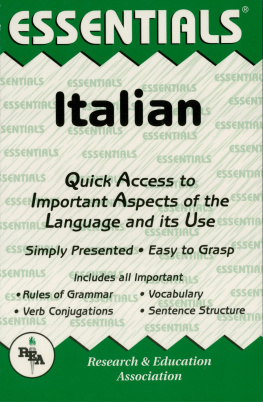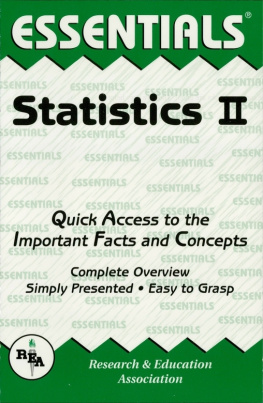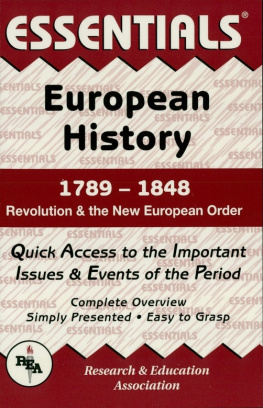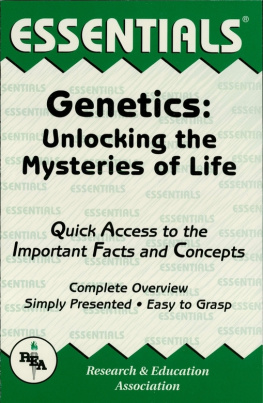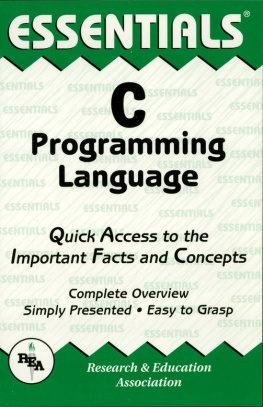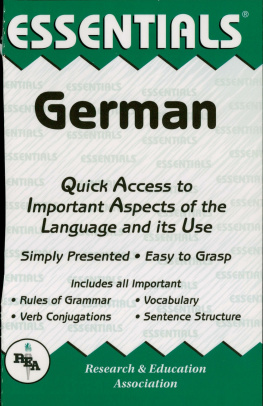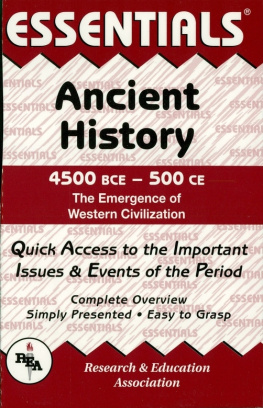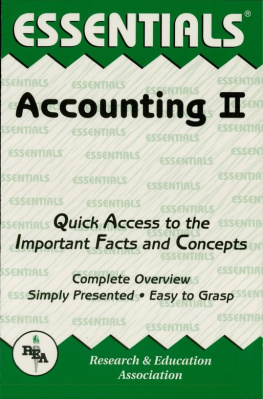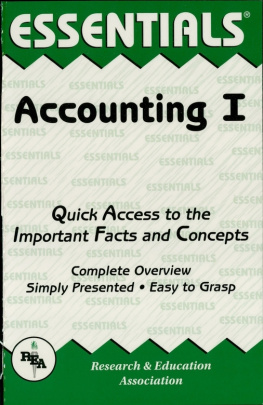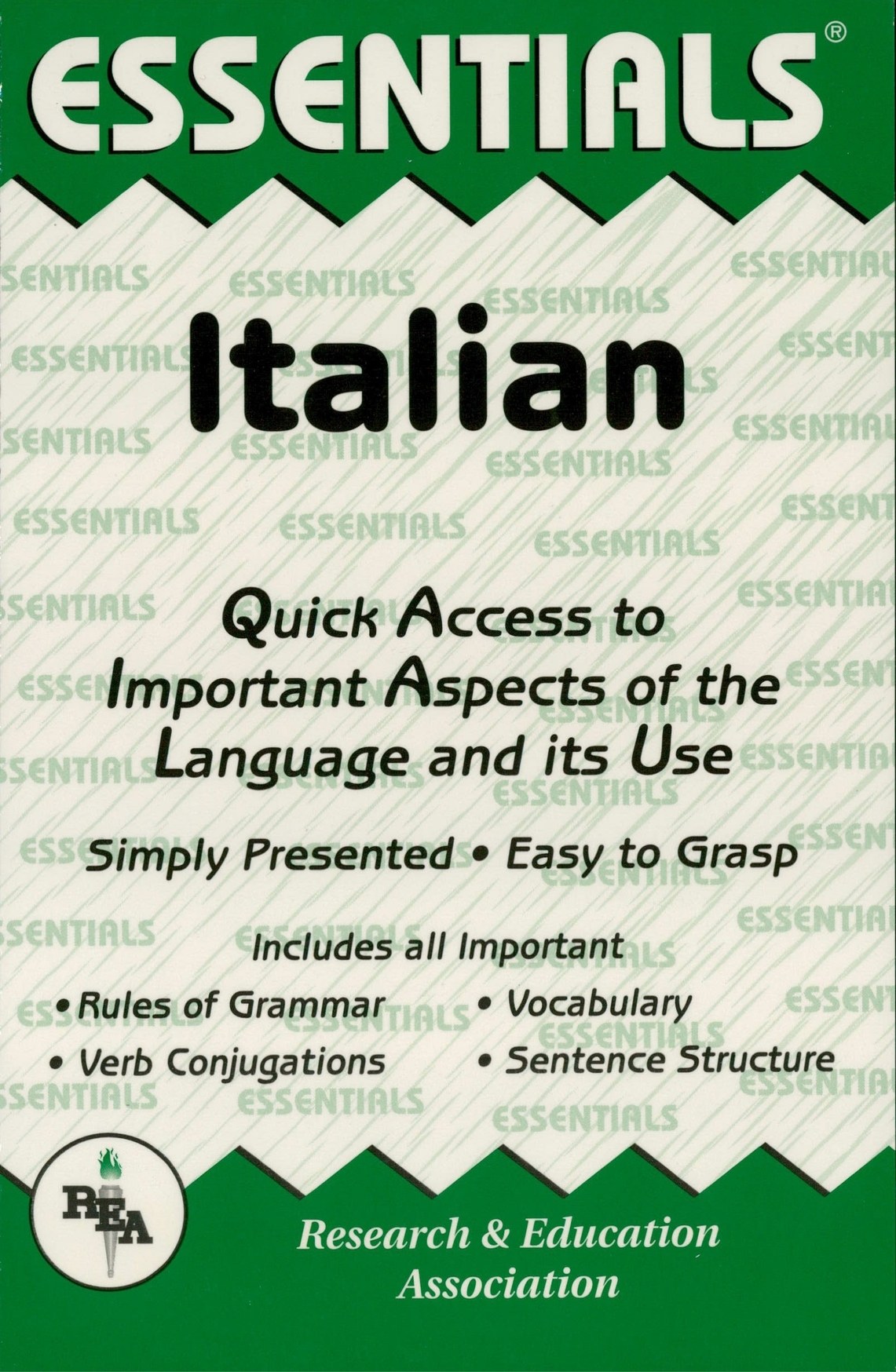1.1 Letters and Pronunciation
Italian is a very phonetic language, which means that it is spoken the way it is written. Its alphabet consists of 21 letters.
The Alphabet and Its Pronunciation
a = a (ah)
b = bi (bee)
c = ci (chee)
d = di (dee)
e = e (eh)
f = effe (effay)
g = gi (gee)
h = acca (accah)
i = i (ee)
l = elle (ellay)
m = emme (emmay)
n = enne (ennay)
o = o (oh)
p = pi (pee)
q = cu (coo)
r = erre (erray)
s = esse (essay)
t = ti (tee)
u = u (ooh)
v = vu (voo)
z = zeta (tsaytah)
Letters found in foreign words are:
| j = i lunga (ee lungah) | k = cappa (cappah) |
| w = doppiovu (doppiovoo) | x = ics (eeks) |
| y = ipsilon (ipseelone) |
1.2 Special Consonant Sounds
The hard sound of c and g before a, o, u:
| ca as in carpenter; casa | ga as garland; gatto |
| co as in colon; cosa | go as in gopher; gola |
| cu as in cuckoo; curioso | gu as in guru; gusto |
The soft sound of c and g before e, i:
| ce as in cherry; celeste | ge as in gender; gelato |
| ci as in cheek; cinema | gi as in gene; giorno |
The sound of ci, ce and gi, ge changes to a hard sound when an h follows the c or g:
| chi as in key; chiaro, chiesa | ghi as in geese; ghiaccio |
| che as in Kay; perch, Michele | ghe as in gay; larghe |
gli is an unusual sound not found in English pronunciation. The closest sound to it is the double l of million; figli, foglio
gn sounds like on as in onion; signore, sogno
r is produced by gently fluttering the tongue against the roof of the mouth; rosso, rosa, glorioso.
z has a ts sound in grazie, zucchero and a dz sound in zero, mezzo.
sc before an i or an e has the sound of the English word she. For example, lo sci; sciare; capisce.
sc followed by an h has the sound of the English word ski. For example, schiavo; scheletro; schema.
1.3 Syllabication and Stress
These consonant clusters, ch, gh, gl, gn, and sc, count as single consonants.
A single consonant between two vowels belongs to the following syllable; ca-sa, la-ghi, lar-ghe .
When l or r follows a second consonant and occurs between vowels, the consonant group belongs to the following syllable; qua-dro, nu-cle-are.
When a double consonant occurs between two vowels or between l or r, the first consonant belongs to the preceding syllable, the second to the following syllables; mam-ma, sor-el-la.
1.3.1 Stress
Most Italian words stress the next-to-last syllable:
finestra (fi- ne -stra)
lavagna (la- va -gna)
If a word is stressed on the last syllable it must be accented:
caff (caf- f )
bont (bon- t )
Note: When stress is not shown as part of the spelling, it is difficult to determine which syllable is stressed:
gondola ( gon -do-la)
camera ( ca -me-ra)
1.4 Double Consonants
A single consonant is pronounced with a concise, clipped, sharp sound, whereas a double consonant is held for two beats as in music; sete/sette, rosa/rossa, papa/pappa.
1.5 The Silent H
The letter h has no sound of its own, but it changes the pronunciation of other letters:
io ho
tu hai
egli ha
CHAPTER 2
Auxiliary Verbs Avere and Essere
2.1 Avere: Present Tense
The verb avere (to have) is an irregular verb. Its forms in the present tense are:
| Singular | Plural |
|---|
| io ho I have | noi abbiamo we have |
| tu hai you have (familiar) | voi avete you have (familiar) |
| lei/ella ha she, it has | loro hanno they have |
| lui/egli ha he, it has | essi/esse hanno they have |
| Lei ha you have (formal) | Loro hanno you have (formal) |
2.2 Avere: Idiomatic Expressions
Many idioms are formed with avere. The most common of these are:
avere caldo to be hot
Gianni ha caldo in estate. Johnny is hot in summer.
avere freddo to be cold
Noi abbiamo freddo in inverno. We are cold in winter.
avere fame to be hungry
Lui ha fame a mezzogiorno. Hes hungry at noon.
avere sete to be thirsty
lo ho sete quando fa caldo. Im thirsty when its hot.
avere sonno to be sleepy
Gli alunni hanno sonno nella classe. The students are sleepy in class.
avere paura to be afraid
Maria ha paura del lupo. Mary is afraid of the wolf.
avere fretta to be in a hurry
Il professore ha fretta. The teacher is in a hurry.
avere ragione to be right
Il babbo ha sempre ragione. Dad is always right.
avere torto to be wrong
La mamma non ha mai torto. Mom is never wrong.
avere...anni to be... years old
Quanti anni hai? How old are you?
Ho ventun anni. Im 21 years old.
2.3 Essere: Present Tense
The verb essere (to be) is an irregular verb. Its forms in the present tense are:
| Singular | Plural |
|---|
| io sono I am | noi siamo we are |
| tu sei you are (familiar) | voi siete you are (familiar) |
| lei/ella she, it is | loro sono they are |
| lui/egli he, it is | essi/esse sono they are |
| Lei you are (formal) | Loro sono you are (formal) |
Note: Both the io and loro forms use sono.
2.4 Essere: Idiomatic Expressions
essere di to be from
Di dove sei? Sono di Roma. Where are you from? Im from Rome.
essere di to belong to
Di chi la penna? di Rosa. Whose pen is it? Its Rosas.
c/ci sono there is/there are
C uno sbaglio. There is a mistake. Ci sono sbagli. There are mistakes.
com/come sono? how is, how are? (used to elicit descriptions)
Com Angelina? una ragazza simpatica. How is Angelina? [describe her] Shes a lovely girl.
Come sono la pasta? E deliziosa. Hows the pasta? Its delicious.
2.5 Past Participles
Avere = avuto (had)
Essere = stato/a/i/e (been)
2.6 Present Perfect
Avere
| Singular | Plural |
|---|
| io ho avuto I had | noi abbiamo avuto |
| tu hai avuto | voi avete avuto |
| lei/ella ha avuto | loro hanno avuto |
| luilegli ha avuto | essilesse hanno avuto |
| Lei ha avuto | Loro hanno avuto |
Essere
| Singular | Plural |
|---|
| io sono stato(a) I have been | noi siamo stati(e) we were |
| tu sei stato(a) | voi siete stati(e) |
| lei/ella stato(a) | loro sono stati(e) |
| lui/egli stato(a) | essi/esse sono stati(e) |
| Lei stato(a) | Loro sono stati(e) |
2.7 Present Participle (Gerund) of Avere and Essere
Avere = avendo having
Essere = essendo being

